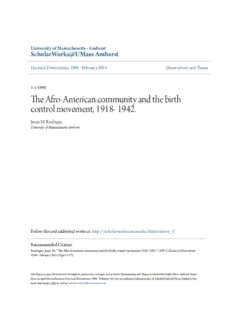
The Afro-American community and the birth control movement, 1918 PDF
Preview The Afro-American community and the birth control movement, 1918
UUnniivveerrssiittyy ooff MMaassssaacchhuusseettttss AAmmhheerrsstt SScchhoollaarrWWoorrkkss@@UUMMaassss AAmmhheerrsstt Doctoral Dissertations 1896 - February 2014 1-1-1991 TThhee AAffrroo--AAmmeerriiccaann ccoommmmuunniittyy aanndd tthhee bbiirrtthh ccoonnttrrooll mmoovveemmeenntt,, 11991188-- 11994422.. Jessie M. Rodrique University of Massachusetts Amherst Follow this and additional works at: https://scholarworks.umass.edu/dissertations_1 RReeccoommmmeennddeedd CCiittaattiioonn Rodrique, Jessie M., "The Afro-American community and the birth control movement, 1918- 1942." (1991). Doctoral Dissertations 1896 - February 2014. 1173. https://doi.org/10.7275/fdv8-pq69 https://scholarworks.umass.edu/dissertations_1/1173 This Open Access Dissertation is brought to you for free and open access by ScholarWorks@UMass Amherst. It has been accepted for inclusion in Doctoral Dissertations 1896 - February 2014 by an authorized administrator of ScholarWorks@UMass Amherst. For more information, please contact [email protected]. THE AFRO-AMERICAN COMMUNITY AND THE BIRTH CONTROL MOVEMENT 1918-1942 A Dissertation Presented by JESSIE M. RODRIQUE Submitted to the Graduate School of the University of Massachusetts in partial fulfillment of the requirements for the degree of DOCTOR OF PHILOSOPHY May 1991 History Department @ Copyright by Jessie M. Rodrique All Rights Reserved THE AFRO-AMERICAN COMMUNITY AND THE BIRTH CONTROL MOVEMENT 1918-1942 A Dissertation Presented by JESSIE M. RODRIQUE Approved as to style and content by uoyce~ Berkman, Chair A~. JcMin^Bracey Member 7 , Bruce Laurie, Member JacklTager, Member Robert Jones, Department Head ^ History ABSTRACT THE AFRO-AMERICAN COMMUNITY AND THE BIRTH CONTROL MOVEMENT 1918-1942 MAY 1991 JESSIE M. RODRIQUE B.A., ASSUMPTION COLLEGE , Ph.D., UNIVERSITY OF MASSACHUSETTS Directed by: Professor Joyce A. Berkman This dissertation examines the role of Afro-Americans in the U.S. birth control movement in the years between 1918-1942. It argues that Afro-Americans of all classes not only supported the idea of birth control but were also a significant force in shaping the national birth control debate, educating their communities and delivering contraceptives to women. During a period when white advocacy of birth control became increasingly conservative, black birth control advocates advanced a broad, often radical, rationale for contraception. While the black and white communities often worked together to provide services to black women in many locations throughout the country, Afro- Americans worked independently of the national, white dominated birth control organizations. Additionally, the iv organizational strategies of Afro-American birth control advocates were found to be different from those of their white counterparts. The differences were due, in part, to Afro-Americans' strong community orientation, their belief in each person's right to good health and that the state should provide health care, and their nonhierarchial approach to the "professional's" relationship with other health providers and birth control users. v TABLE OF CONTENTS Page ABSTRACT iv Chapter INTRODUCTION 1 THE AMERICAN BIRTH CONTROL MOVEMENT: 1. ... ITS SCHOLARS, BACKGROUND AND ADVOCATES. 15 2. THE AFRO-AMERICAN BIRTH CONTROL MOVEMENT OF THE TWENTIES 59 3. THE AFRO-AMERICAN BIRTH CONTROL MOVEMENT .... OF THE THIRTIES: GROWTH AND EVOLUTION 86 AFRO-AMERICAN CLINICS: HARLEM AS A CASE STUDY. 135 4. . AFRO-AMERICAN CLINICS: THE NATION 163 5. CONCLUSION 218 6. APPENDIX: NATIONAL SPONSORING COMMITTEE, DIVISION OF NEGRO SERVICE, 1942 223 225 BIBLIOGRAPHY vi INTRODUCTION In the late nineteenth and early twentieth centuries the birth rate declined significantly among white and black Americans. Among Afro-Americans, the growth of their population by World War II was more than cut in half. By 1945 the average number of children per women was 2.5, and the degree of childlessness, especially among urban blacks, had reached unprecedented proportions. Among native, white American women the fertility rate "fell from 7.04 in 1800 to 4.24 in 1880 and 3.56 in 1900. "2 By 1900 the fertility rate was half of what it was a century before. 3 Among these white women, scholars interpret the demographic changes as deliberate. Contraception is assumed to be a contributing 1 Reynolds Farley, Growth of the Black Population (Chicago: Markham Publishing Co., 1970), 3, 75; Stanley Engerman, "Changes in Black Fertility, 1880-1940," in Family and Population in Nineteenth Century America ed. Tamara K. Hareven and Maris Vinovskis (Princeton: Princeton University Press, 1978), chapter 3; E. Franklin Frazier, The Negro Family in Chicago (Chicago: The University of Chicago Press, 1932), 136-146. 2 Linda Gordon, Woman's Body Woman's Right: A Social History of Birth Control in America (New York: Penguin Books, 1974), 154. 3 John D'Emilio and Estelle B. Freedman, Intimate Matters: A History of Sexuality in America (New York: Harper Row Publishers, 1988), 173. & 2 factor. By contrast, among black Americans the population decline is not seen as deliberate. Rather, the decline is attributed to the inferior health of black women and men. Very rarely is it explained as a result of deliberate contraceptive use, despite studies by a handful of demographers in the mid thirties who correctly hypothesized its use among Afro-Americans/ What, then, were the reasons for the declining birth rate of black Americans from late nineteenth to the mid-twentieth century? Is there a valid basis for the incongruence of interpretations for declining birth rates in the black and white communities? Profound changes in the demographics and sexual ideology of native, white Americans preceded the advent of the modern birth control movement, which was an organized social movement that sought to expand reproductive choices for women through the distribution of mechanical means of contraception. The rise of the birth control movement is usually correlated to the simultaneous onset of urbanization and industrialization. However, birth rates per family began For a review of the demographic literature, see Joseph McFalls and George Masnick, "Birth Control and the Fertility of the U.S. Black Population, 1880 to 1980," Journal of Family History 6 (1981); 89-106; Peter Uhlenberg, "Negro Fertility Patterns in the United States," Berkeley Journal of Sociology 11 (1966): 56; James Reed, "Birth Control in American Social Science," in From Private Vice To Public Virtue (New York: Basic Books, 1978): 197-210.
Description: